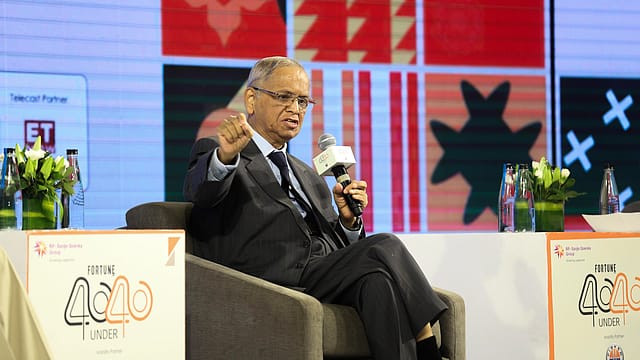Narayana Murthy proposes $20 bn investment to produce teachers of tomorrow
ADVERTISEMENT

Infosys co-founder Narayana Murthy, during a speech on the Infosys Prize 2023 announcement ceremony hosted by the Infosys Science Foundation in Bengaluru today, said to improve the quality of India’s primary, secondary, and higher educational institutions for independent, critical, and analytical thinking, the government should invite 10,000 retired highly accomplished teachers from the developed world and from India in STEM areas to create 2,500 “Train the Teacher” colleges in the country.
Murthy says the government should pay about $100,000 a year for each of these retired teachers. "This 20-year program will cost us $1 billion a year and $20 billion for twenty years. Our nation, targeting a GDP of $5 trillion soon, will not find it a big financial burden."
He says invention and innovation are the "two children of an inquiring mind" fortified by higher education and research. "There are four stages in the invention and innovation lifecycle of a nation," he says, adding that there are four stages in the invention and innovation lifecycle of a nation.
January 2026
Netflix, which has been in India for a decade, has successfully struck a balance between high-class premium content and pricing that attracts a range of customers. Find out how the U.S. streaming giant evolved in India, plus an exclusive interview with CEO Ted Sarandos. Also read about the Best Investments for 2026, and how rising growth and easing inflation will come in handy for finance minister Nirmala Sitharaman as she prepares Budget 2026.
He says in stage 01, a nation generally does not invent and innovate and does not even use those ideas coming from other nations to improve the lives of its citizens. In stage 02, he says, a nation generally starts producing products and services using the inventions and innovations of other nations without any improvement and makes the lives of its citizens better."
In stage 03, a nation generally leverages higher education and research to innovate and improve on those from other nations for better productivity, quality, cost, and comfort, says the tycoon, adding that the next stage (stage 04) is when a nation becomes an inventor of new processes, products, and services.
The Infosys veteran says the country "must show much respect and pay better salaries to our teachers and researchers. We must also provide better facilities to our researchers. We must honour them."
Infosys Science Foundation (ISF) announced the winners of the Infosys Prize 2023 in six categories -- engineering and computer science, humanities, life sciences, mathematical sciences, physical sciences, and social sciences. The prize for each category comprises a gold medal, a citation, and a prize purse of $100,000 (or its equivalent in INR).
The laureates of Infosys Prize 2023 were shortlisted from 224 nominations by an international panel of jurors comprising world-renowned scholars and experts. On their achievement, Murthy says: “The laureates of the Infosys Prize have shown us the importance of this adaptive thinking through their approach to problem-solving.”
The Infosys Prize 2023 in Engineering and Computer Science is awarded to Sachchida Nand Tripathi, Professor, Sustainable Energy Engineering (SEE), IIT-Kanpur, for the deployment of a large-scale sensor-based air quality network and mobile laboratory for hyper-local measurements of pollution, data generation and analysis using artificial intelligence and machine learning for effective air quality management and citizens awareness.
The Infosys Prize 2023 in Humanities goes to Jahnavi Phalkey, Founding Director, Science Gallery Bengaluru, for her insights into the individual, institutional, and material histories of scientific research in modern India.
The Life Sciences award has been given to Arun Kumar Shukla. He is a Professor, Biological Sciences and Bioengineering, at IIT-Kanpur. He was honoured for his contributions to the field of G-protein coupled receptor (GPCR) biology.
In Mathematical Sciences, the coveted prize went to Bhargav Bhatt, Fernholz Joint Professor, Institute for Advanced Study and Princeton University, for contributions to arithmetic geometry and commutative algebra. In Physical Sciences and Social Sciences, the awards go to Mukund Thattai, Professor, Biochemistry, Biophysics and Bioinformatics, National Centre for Biological Sciences, and Karuna Mantena, Professor, Political Science, Columbia University. Thattai has been awarded for his contributions to evolutionary cell biology and Mantena for research on the theory of imperial rule.
